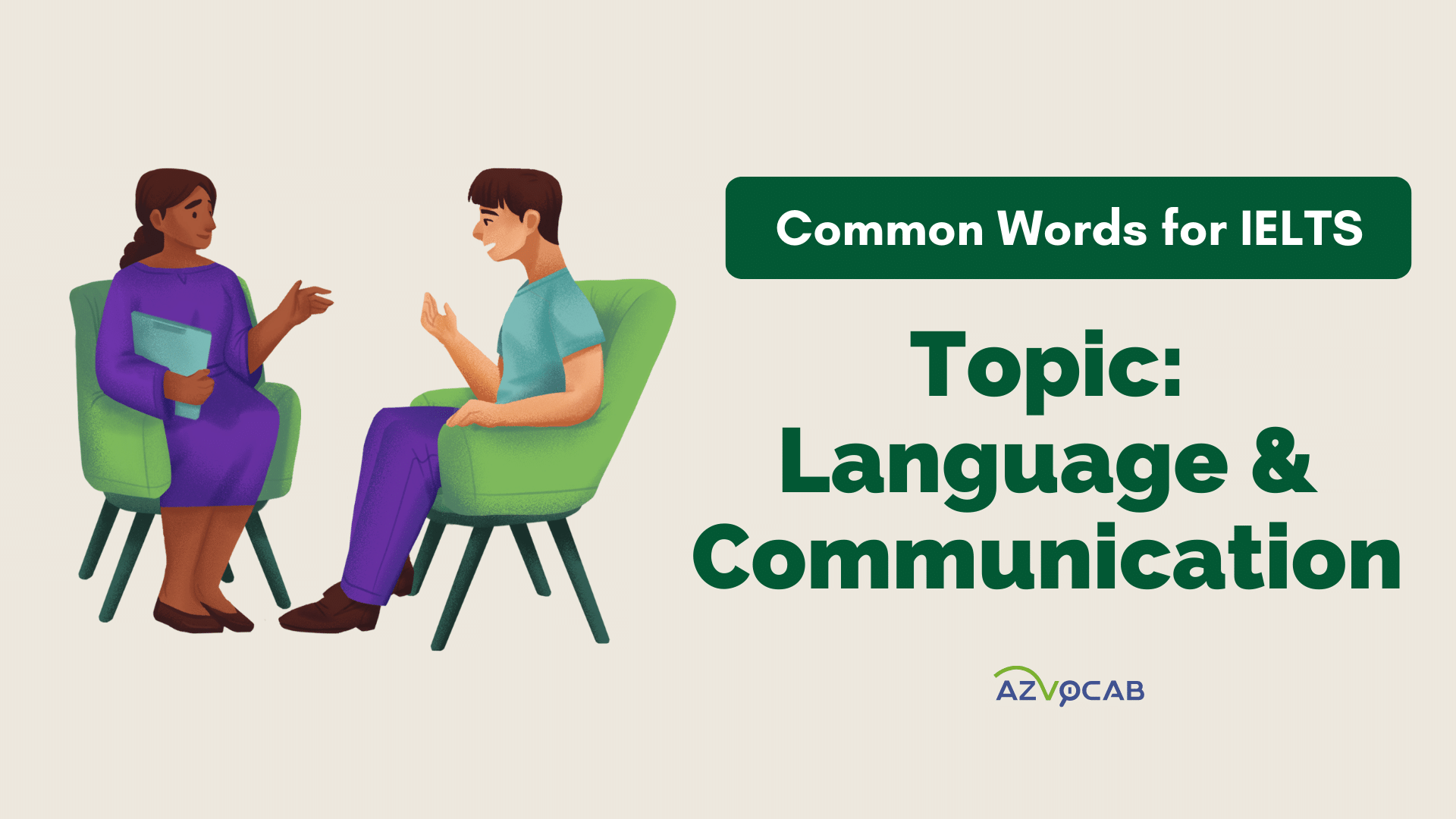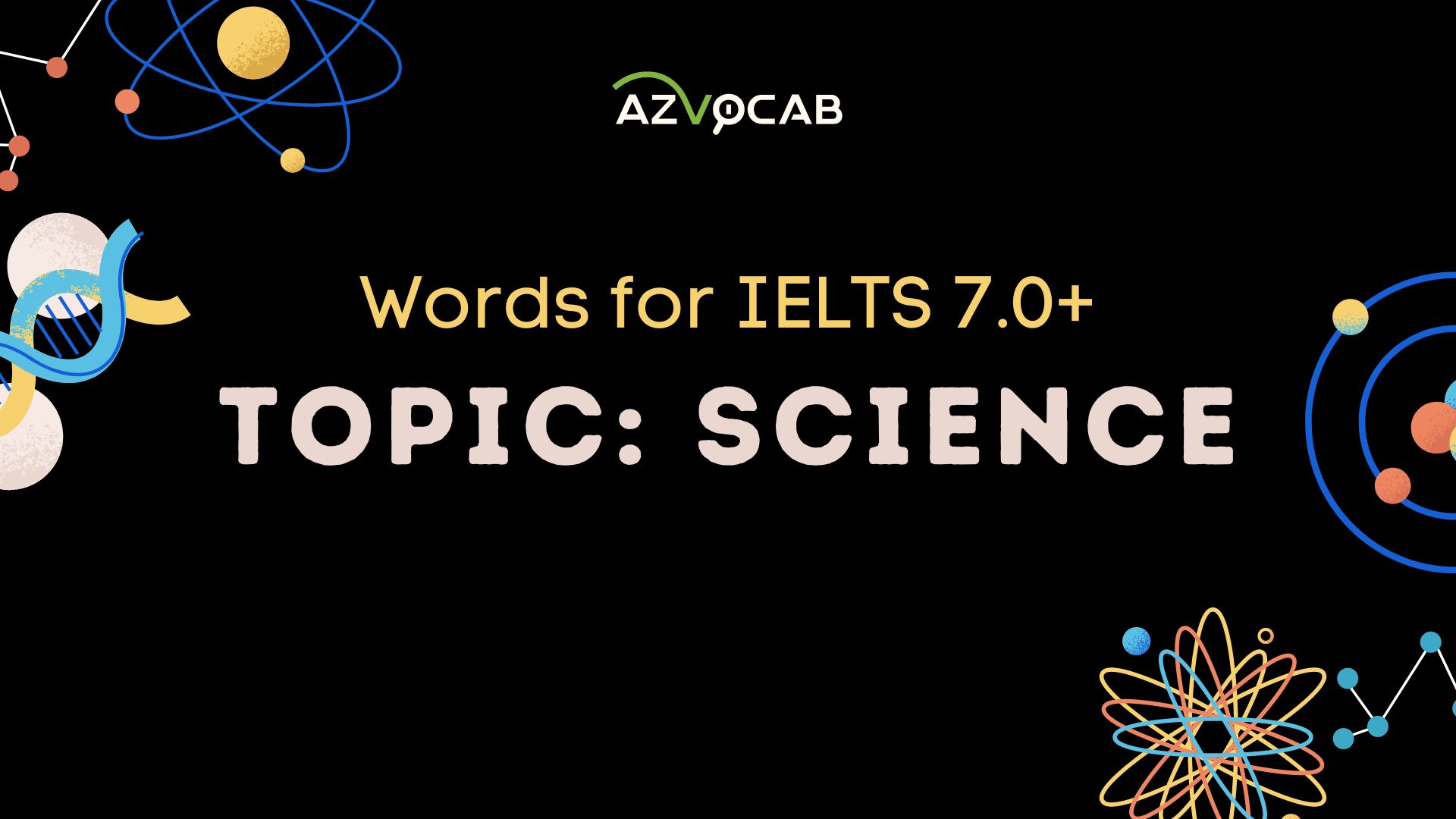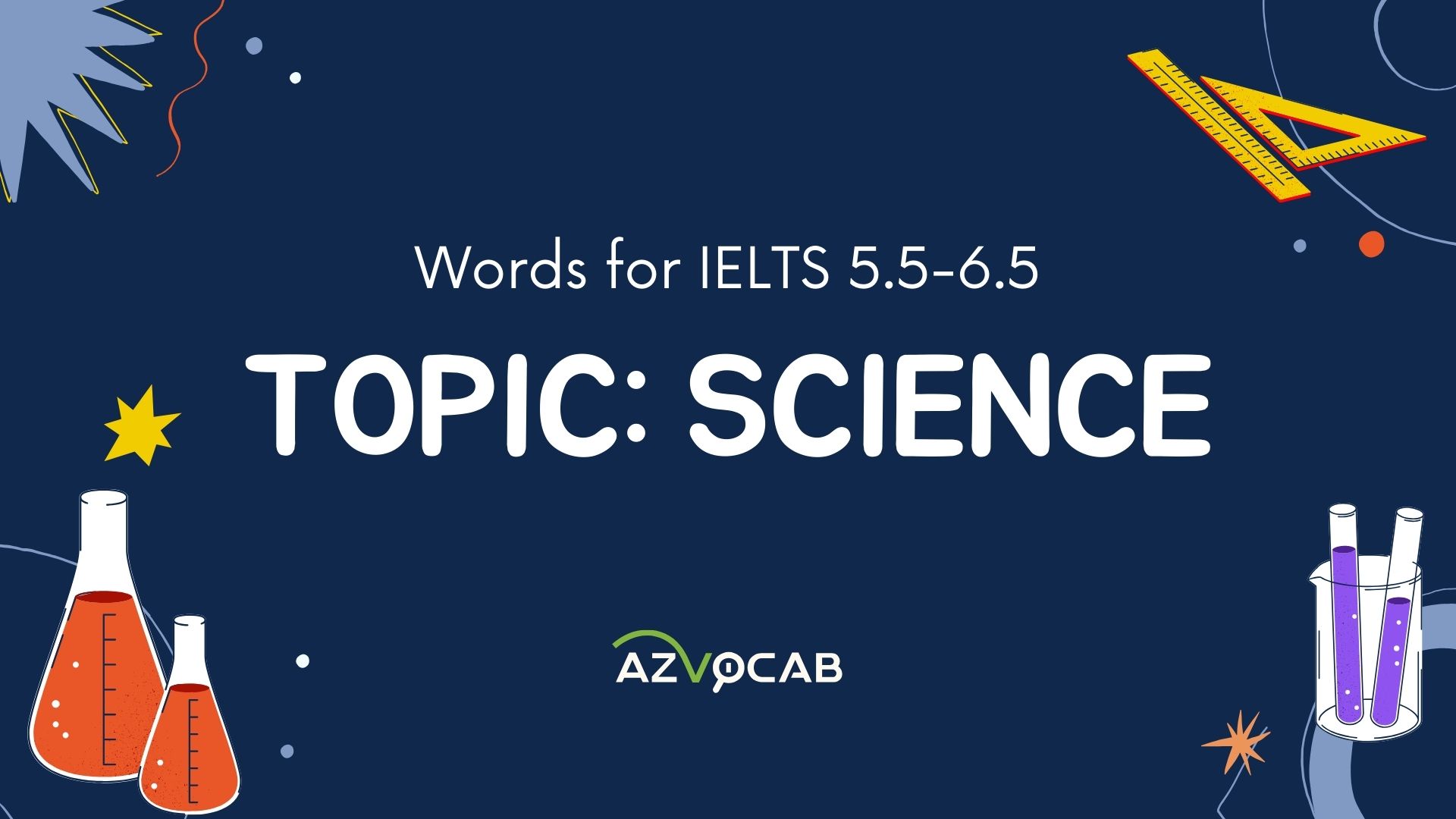Compilation of common words of the topic of Language and Communication for the IELTS exam
29 August, 2023Common words for IELTS

azVocab has compiled over 40 of the most common words related to the topic of Language and Communication for the IELTS exam.
These vocabulary words can be used in four skills: Reading, Listening, Speaking, and Writing. The examples chosen by azVocab are carefully selected in specific contexts in IELTS exams. This will help you understand how to use words in context, increasing the effectiveness of your vocabulary learning.
1. Vocabulary related to some linguistic concepts and the development of language
| accuracy (n.) – the fact of being exact or correct | I learned that communication was more important than accuracy. |
| concept (n.) – a principle or idea | Concepts that an older signer uses a single sign for, such as rolling and falling, have been unpacked into separate signs by youngsters. |
| fluency (n.) – the ability to speak or write a language easily, well, and quickly | Fluency is what helps you to function properly – it’s what helps you get a job, hold a conversation or just buy the things you need. |
| linguist (n.) – someone who studies foreign languages or can speak them very well, or someone who teaches or studies linguistics | Linguists believe that deaf children are born with the ability to link gestures to meaning. |
| linguistics (n.) – the scientific study of the structure and development of language in general or of particular languages | Modern linguistics emerged as a distinct field in the nineteenth century. |
| pronunciation (n.) – how words are pronounced | I didn’t really have a problem with pronunciation like the other kids in my class. |
| vocabulary (n.) – all the words that exist in a particular language or subject | Every week our Spanish teacher gives us a list of vocabulary to learn. |
| inherent (adj.) – existing as a natural or basic part of something | What intrigues the linguists is that, for sign language to emerge spontaneously, deaf children must have some inherent tendency to link gestures to meaning. |
| arise (v.) – to start to happen or exist | There are over 6,000 different languages today, and the main language families are thought to have arisen as modern humans wandered about the globe in four great migrations beginning 100,000 years ago. |
| colonise (v.) – to send people to live in and govern another country | How could our speechless Homo sapiens ancestors colonise the ancient world, spreading from Africa to Asia, and perhaps making a short sea crossing to Indonesia, without language? |
| emerge (v.) – to appear by coming out of something or out from behind something | The language emerged in the late 1970s, at a new school for deaf children. |
| evolve (v.) – to develop gradually, or to cause something or someone to develop gradually | There are over 6,000 different languages today, but how did language evolve in the first place? |
| unprecedented (adj.) – never having happened or existed in the past | In fact, research indicates that languages are dying out at an unprecedented rate. |
| signify (v.) – to be a sign of something; to mean | Nobody really knows what the marks on the ancient stones signify. |
| pronounce (v.) – to say a word or a letter in a particular way | The individual sounds are very strange to other nationalities and often difficult for them to pronounce. |
2. Vocabulary related to types of language and communication subjects
| dialect (n.) – a form of a language that people speak in a particular part of a country, containing some different words and grammar, etc. | Just as biologists rarely see a new species arise, linguists rarely get to discover an unknown dialect or even better, to see a new language being born. |
| gesture (n.) – a movement of the hands, arms, or head, etc. to express an idea or feeling | In spoken language these units are words; in sign language these units are gestures. |
| language (n.) – a system of communication consisting of sounds, words, and grammar | Academics have been able to follow the formation of a new language in Nicaragua. |
| mother tongue (n.) – the first language that you learn when you are a baby, rather than a language learned at school or as an adult | I can speak three languages fluently, but Italian is my mother tongue. |
| native speaker (n.) – someone who has spoken a particular language since they were a baby, rather than having learned it as a child or adult | You also need to speak to native speakers of the language as much as you can. |
| sign language (n.) – a system of hand and body movements representing words, used by and to people who cannot hear or talk | The catch is that it is not a spoken language but, rather, a sign language which arose spontaneously in deaf children. |
3. Vocabulary related to communication
| communication (n.) – the act of communicating with people | Marc Hauser (Harvard University) and colleagues argue that the study of animal behaviour and communication can teach us how the faculty of language in the narrow human sense evolved. |
| hesitation (n.) – the act of pausing before doing something, especially because you are nervous or not certain | He has the ability to speak without hesitation because he has practiced regularly. |
| impressive (adj.) – if an object or achievement is impressive, you admire or respect it, usually because it is special, important, or very large | She has an impressive command of the English language. |
| incoherent (adj.) – expressed in a way that is not clear, especially with ideas or words that are not connected in a sensible or clear way | The talk she gave was incoherent and badly prepared. |
| one-to-one (adj.) – a one-to-one activity involves two people talking directly, usually with one teaching or giving information to the other | Authors distinguish advertising from salesmanship by defining it as mediated persuasion aimed at an audience rather than one-to-one communication with a potential customer. |
| reliable (adj.) – someone or something that is reliable can be trusted or believed because he, she, or it works or behaves well in the way you expect | Current reliable figures on the incidence of plagiarism are surprisingly scarce, perhaps because universities are loath to reveal them. |
| sophisticated (adj.) – having a good understanding of the way people behave and/or a good knowledge of culture and fashion | Evershed suggests that the Ancient Egyptians had surprisingly sophisticated knowledge of how to use various preservatives. |
| spontaneous (adj.) – happening or done in a natural, often sudden way, without any planning or without being forced | I am certain both these statements were spontaneous and genuine. |
| communicate (v.) – to share information with others by speaking, writing, moving your body, or using other signals | In his own management style, he certainly seems to communicate well with his team and holds regular meetings. |
| comprehend (v.) – to understand something completely | The infinite distances of space are too great for the human mind to comprehend. |
| clarify (v.) – to make something clear or easier to understand by giving more details or a simpler explanation | The Foreign Secretary’s remarks clarify an ambiguous statement issued earlier this week. |
| converse (v.) – to have a conversation with someone | Dr Senghas showed this by asking signers of different ages to converse about a set of photographs that each could see. |
| define (v.) – to say what the meaning of something, especially a word, is | Your essay is good, but you need to define the causes of pollution more clearly. |
| demonstrate (v.) – to show or make something clear | The students demonstrated a good knowledge of fundamental principles. |
| distinguish (v.) – to notice or understand the difference between two things, or to make one person or thing seem different from another | Early users did not develop a way of distinguishing left from right. |
| explain (v.) – to make something clear or easy to understand by describing or giving information about it | Teachers also need to be able to explain things clearly and in a way that is easy to follow. |
| gesture (v.) – to use a gesture to express or emphasize something | When he asked where the children were, she gestured vaguely in the direction of the beach. |
| illustrate (v.) – to draw pictures for a book, magazine, etc. | They mentioned the term to illustrate the type of communication needs faced by early man. |
| imply (v.) – to communicate an idea or feeling without saying it directly | She was upset by the implied criticism. |
| indicate (v.) – to show, point, or make clear in another way | Nor could their younger partners teach them the signs that indicate left and right. |
| recall (v.) – to bring the memory of a past event into your mind, and often to give a description of what you remember | She recalled seeing a work by Robert Rauschenberg that had been damaged and then meticulously restored. |
| stutter (v.) – to speak or say something, especially the first part of a word, with difficulty, for example pausing before it or repeating it several times | She stutters a little, so be patient and let her finish what she’s saying. |
| suggest (v.) – to mention an idea, possible plan, or action for other people to consider | Dean Falk (Florida State University) suggests that, before the first smattering of language there was motherese, that musical gurgling between a mother and her baby, along with a lot of eye contact and touching. |
| translate (v.) – to change words into a different language | I could produce essays and translate eighteenth-century texts without much difficulty and I actually enjoyed learning the grammar rules. |
| refer to (phr.v) – to talk or write about someone or something, especially in only a few words | The other had to guess which photograph he was referring to. |
I hope the common vocabulary related to the topic of Language and Communication will help you better prepare for the IELTS exam and achieve the highest results. Stay tuned for more articles on common vocabulary in other topics for the IELTS exam on the azVocab blog!
ielts
ielts vocabulary
2131
Share





